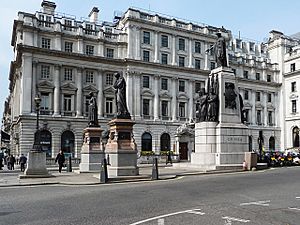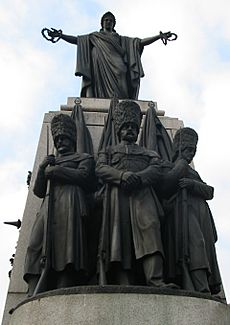Guards Crimean War Memorial facts for kids
Quick facts for kids The Guards Crimean War Memorial |
|
|---|---|
| United Kingdom | |
 |
|
| For the Allied victory and those who died in the Crimean War | |
| Unveiled | 1861 (relocated 1915) |
| Location | 51°30′26.46″N 0°7′57.71″W / 51.5073500°N 0.1326972°W St James's, London
|
| Designed by | John Henry Foley and Arthur George Walker |
|
CRIMEA
|
|
The Guards Crimean War Memorial is a special monument in London. It remembers the soldiers who fought and won the Crimean War (1853–1856). This important memorial is located in St James's, a part of London. You can find it on Waterloo Place, where Regent Street and Pall Mall meet. It stands between the Duke of York Column and Piccadilly Circus.
What the Memorial Looks Like
This memorial was first shown to the public in 1861. It features statues of three Guardsmen, who were soldiers from special regiments. There is also a female figure that represents "Honour."
The statues are made of bronze. Some parts of the memorial were even made from cannons. These cannons were captured during the Siege of Sevastopol, a big battle in the Crimean War. The artist who created these statues was John Bell.
Messages on the Memorial
There are several important messages carved into the memorial. On the front, near the soldiers' statues, you can find two plaques.
The first plaque tells us about the start of the monument:
- The first stone of the Guards' Memorial was placed in 1861 by Margaret Johanna Bell.
The second plaque explains a change that happened later:
- The Guards' Memorial was taken down in 1914. It was then put back up 30 feet north. This was done to make space for statues of Florence Nightingale and Sidney Herbert.
On the back of the memorial, facing the road towards Piccadilly, there is another plaque. It is shaped like a shield and surrounded by leaves and guns. This plaque honors the soldiers:
- This memorial remembers 2,152 Officers, Non-Commissioned Officers, and Privates from the BRIGADE OF GUARDS. They died during the war with Russia from 1854 to 1856. Their fellow soldiers built this memorial.
Moving the Memorial
In 1914, the memorial was moved a little further north. This was to create space for two new statues. These statues honored Florence Nightingale and Sidney Herbert. Florence Nightingale was a famous nurse during the Crimean War. Sidney Herbert was the Secretary at War, meaning he was in charge of the army during the war.
When the memorial was moved, the female figure that used to be called "Honour" was then called "Victory." The statue of Florence Nightingale was made by Arthur George Walker. The statue of Sidney Herbert was created by John Henry Foley.
 | Jackie Robinson |
 | Jack Johnson |
 | Althea Gibson |
 | Arthur Ashe |
 | Muhammad Ali |


